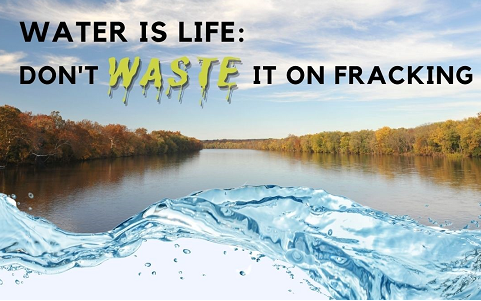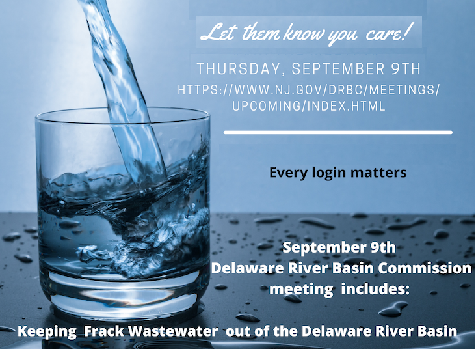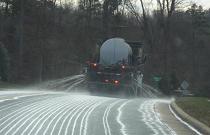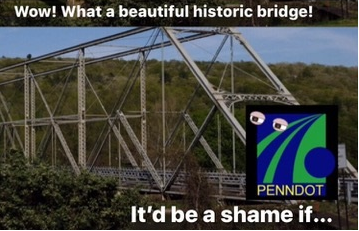
Water is Life: Don’t Waste it on Fracking – Webinar
September 8, 2021
Delaware River Frack Ban Coalition to DRBC: Pass a FULL BAN on Fracking
September 14, 2021Dear Secretary McDonnell and Deputy Secretary Perry,
In the past five years, the Pennsylvania Department of Environmental Protection has taken important steps to protect the environment and the public from contamination resulting from the road spreading of waste from unconventional drilling, banned in 2016, and conventional waste, put under a moratorium in 2018. An audio recording of a discussion of road spreading at the August 19 meeting of the PA Grade Crude [Oil] Development Advisory Council reveals that the agency is working to develop rules that would once again allow the use of conventional waste on unpaved roads as a dust suppressant. We are writing to you today to express our concerns about comments made by Kurt Klapkowski, Director of the Bureau of Oil and Gas Planning and Program Management, and to urge you to ban outright the road spreading of conventional waste.
Klapkowski told the Council, “We have to be able to defend our decisions with data. And that was the attempt, with working with Penn State, that’s what we were attempting to do was to develop that data to be able to have a program that we could go to the Environmental Hearing Board and the Commonwealth Court and Supreme Court under the constitution and under the statutes that we administer, that would be defensible.”
He continued, “I don’t think we would have any objection to working with [the Council] and the Legislature to try to figure out a way to develop that data. I think we’re hopeful that the study that we funded and expect to have finished will provide data that will allow us to have a program that we can defend in court. But that’s really the bottom line for us, I mean we can only exercise the authority that we’re given within the limitations that we have and that’s what we’re attempting to do.” The study he refers to is the PennState study expected to be completed by the end of the year.
A growing body of peer-reviewed research has consistently demonstrated that road spreading of drilling waste damages the environment and poses risks to public health. As is the case with virtually all peer-reviewed research on oil & gas drilling, the trajectory has been one that has broadened and deepened our understanding of impacts already occurring and potential risks, not one that has reversed our thinking in any way. Spending taxpayer dollars in the search for data to support your intended policy shift is an unacceptable professional and ethical breach of your duty to the Constitution you swore to uphold.
DEP must halt any plans to develop regulations that would allow road spreading of drilling waste. Instead, the DEP must ban road spreading of drilling waste under any circumstances.
Further, the current moratorium on road spreading contains a dangerous loophole that an outright ban would close. Companies are allowed to make a coproduct self-determination that allows road spreading of conventional waste. DEP defines a coproduct as “a material generated by a manufacturing or production process, or a spent material, of a physical character and chemical composition that is consistently equivalent to the physical character and chemical composition of an intentionally manufactured product or produced raw material, if the use of the material presents no greater threat of harm to human health and the environment than the use of the product or raw material.”
Part (d) of section § 287.8 of the Pennsylvania Code states that, “A person who completes a coproduct determination shall maintain documentation supporting the determination. This documentation shall be available to the Department upon request.”
PIOGA representative Burt Waite said in his remarks to the Council that the DEP has been requesting copies of the self-determinations this summer and that the action has left operators “nervous”. It would appear that DEP did not make a practice of requesting copies of self-determinations prior to this summer which suggests that road spreading has gone on since the moratorium was put in place with no oversight by your agency.
DEP must gather all self-determination reports completed to date and make them available to the public.
Finally, the Council expressed concern about a new PennState study, “Efficacy of Oil and Gas Produced Water as a Dust Suppressant”. The study finds road spreading of brine to be “an environmentally unsound” practice that is also less effective than treating roads with commercial products, thanks to brine’s high sodium content that could actually leave some roads dustier.
Among the protestations by Council members were claims that PennState is doing its research in a laboratory, not in the real world, and that Arthur Stewart of the Pennsylvania Grade Crude Oil Coalition and others have received both thank you notes when brine has been spread and complaints that the moratorium has taken away the popular dust suppressant. The Council voted to write a letter to PennState and DEP to ask that they be included in any studies going forward. This letter should be made public.
Last year, the House Environmental Resources and Energy Committee amended SB790 to remove a provision to allow the road spreading of drilling waste. This year, HB1144 expands on the provision in last year’s bill to allow waste to be spread on both unpaved and paved roads. The bill, passed by the House in May, has been referred to the Senate Environmental Resources and Energy Committee. The Council appears to be willing to leapfrog over the legislative process by pressuring the DEP to develop regulations.
DEP must reject the industry’s continued attempts to interfere with credible scientific research and legislative and regulatory processes.
While we were finalizing this letter, Ohio’s Department of Transportation announced it would no longer purchase the controversial Aqua Salina, which is made from drilling waste. Tests have found that the product contains both radium-226 and radium-228. However, the Department’s stated reason is that there are other products that work better.
The recent PennState study came to the same conclusion when it compared drilling waste to commercial products. In attempting to challenge the study, one participant in the Council meeting said that the commercial products should have to go through an environmental review of their own. They have.
PennState’s Center for Dirt and Gravel Road Studies issues a list of products they have approved for use. Although they concur that commercial products are superior to brine, they state that the “products are approved by environmental standards, not performance standards.” Suggesting that the products have not undergone testing is an attempt at misdirection by the industry. If DEP is not going to challenge such assertions, you should, at least, disregard them.
We would be happy to meet with you to further discuss our concerns.




